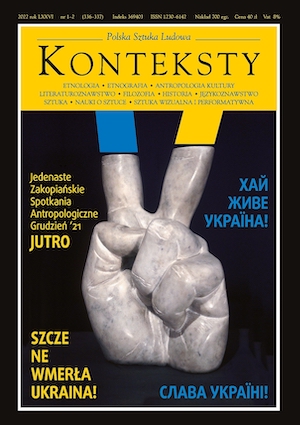Czas abisalny getta a perspektywa „jutra”Leib Goldin, Stella Fiedelseid, Janusz Korczak
The Abyssal Time of the Ghetto and the Perspective of “Tomorrow” Leib Goldin, Stella Fidelseid, Janusz Korczak
Author(s): Jacek LeociakSubject(s): History, Jewish studies
Published by: Instytut Sztuki Polskiej Akademii Nauk
Keywords: Warsaw;ghetto;anthropology
Summary/Abstract: Existence in the ghetto was tantamount to descent into an abyss, also an abyss of time. Barbara Engelking („Czas przestał dla mnie istnieć”. Analiza doświadczenia czasu w sytuacji ostatecznej, 1996) formulates the conceptions of “abyssal category”, “abyssal situation”, and “abyssal time”. The term, which originates from the Greek abyssos, describes the ghetto experience / the experience of the Holocaust. Time spent in the ghetto is abyssal, a life in the fissures of time. I consider testimonies written there and then: the essay about hunger by Leib Goldin, the account by Stella Fidelseid (hiding in a bunker from the outbreak of the Warsaw Ghetto Uprising all the way to December 1943), and fragments of Pamiętnik by Janusz Korczak, and seek in those records something that might be described as “the perspective of tomorrow”. Furthermore, I ponder on how the horizon of “tomorrow”, comprehended literally as the next day and metaphorically as a distant or near future, can reveal itself in abyssal time, bereft of the past and the future and submerged in the extreme “now”.
Journal: Konteksty
- Issue Year: 336/2022
- Issue No: 1-2
- Page Range: 73-80
- Page Count: 8
- Language: Polish

